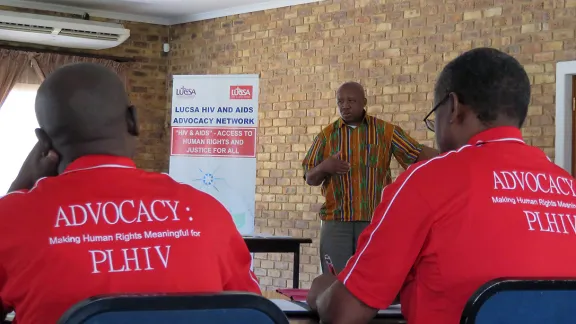
Churches in Africa recognize the urgent need to address the human rights issues associated with the HIV pandemic in Africa. LUCSA executive director Rev. Dr David Tswaedi leads a session of the December workshop in Johannesburg. Photo: LUCSA/Allison Westerhoff
LWF furthers regional collaboration for HIV and AIDS advocacy in Africa
(LWI) – Stigma surrounding HIV and AIDS continues to plague efforts to prevent infections, Lutheran church leaders and health activists from across Africa heard at a regional workshop of The Lutheran World Federation (LWF).
The LWF member church representatives shared their own experiences of how stigma creates fear and shame in people living with HIV and their families.
“Ignorance kills life in abundance,” said Rev. Dr Magdalena Ya-Shalongo, principal of the Engela Parish Institute of the Evangelical Lutheran Church in Namibia, in her keynote address to the workshop, held 9-12 December in Johannesburg.
Losing two brothers to HIV created great adversity for the Namibian pastor as she mourned their loss. She narrated how she worked to sustain her family and fight the stigma associated with the infection.
Still, she held fast to her faith and came to understand that all God’s people are called to advocate for the prevention of HIV and AIDS, urge proper treatment for all those living with the disease and end the stigma and exclusion.
Stigma surrounding HIV and AIDS creates too much space for myths and lies that manifest themselves as fear in people. It creates shame in those who are living with HIV, Ya-Shalongo told fellow AIDS workers.
She said her work around AIDS is guided by the passage in John’s Gospel (10: 10b), “I came that they may have life and have it abundantly.” The theme of the workshop was “Strengthening Regional Networks on HIV and AIDS Advocacy.”
In her reflections, she said the “denial of the prevalence of the virus or being afraid to talk about it allows evil to take hold, and steals the chance for God to stir hearts into action.”
Health and human rights
The LWF initiated the gathering of coordinators of health and wellness programs and church leaders in recognition of the urgent need by churches to address the human rights issues that are increasingly associated with the HIV pandemic in Africa. The Lutheran Communion in Southern Africa (LUCSA) hosted the workshop with funding from the Netherlands-based Robert Carr Fund international organization that supports the AIDS work of civil society networks.
The World Health Organization estimates that out of the 37 million people living with HIV globally, more than 24.7 million—75 percent—are in Africa and only 37 percent of this number receives antiretroviral therapy. Less than half are receiving proper treatment, and possibly do not know their status.
Stigma surrounding the virus plagues prevention and education efforts by churches, especially since HIV is often associated with sexuality, and this topic is taboo in most churches, participants at the workshop heard. The situation presents a complicated socio-economic, development and human rights challenge as myths, traditions, socio-cultural beliefs and practices continue to overshadow the enjoyment of fundamental human rights by those living with HIV.
Zero stigma
The 18 participants from LUCSA, the Lutheran Communion in Central and Eastern Africa (LUCCEA) and the Lutheran Communion in Central and Western Africa (LUCCWA) explored collaboration on regional strategies to end HIV infections and stigma. They met after World AIDS Day, 1 December, which many countries in the region observe each year, currently under the theme, zero new infections, zero stigma and zero HIV-related deaths.
The participants set up a regional HIV and AIDS network and advocacy committee to help increase collaboration between the churches and across the sub-regions. They will also develop a human rights-based handbook.
The LUCSA HIV and AIDS Program has established a model of “mainstreaming” efforts to fight the spread of HIV, which encourages churches to incorporate advocacy and education in their existing programs.
Although LUCCEA and LUCCWA have AIDS programs, there has been little coordination among their respective member churches or across the sub-regions.

(A contribution by LUCSA communications officer Allison Westerhoff, on behalf of the Africa Lutheran Information and Communication Network).


